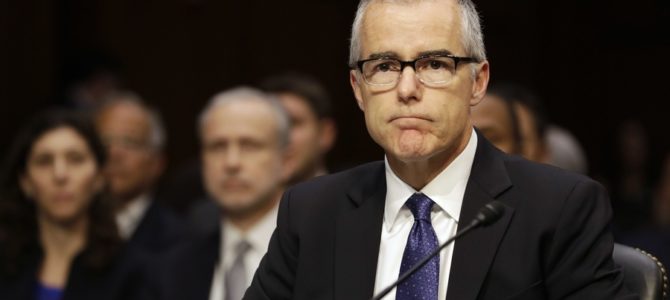
On Thursday afternoon, New York University Law School hosted a panel discussion on reforming the Foreign Intelligence Surveillance Act (FISA), a federal law that allows courts to grant federal agencies warrants to secretly spy on American citizens.
The panel was held by Just Security, an online forum for analysis of national security. Moderated by The Atlantic magazine’s Adam Sewer, speakers were Liza Goitein, co-director of the Brennan Center; Cato Institute senior fellow Julian Sanchez; Andrew Weismann, a lead prosecutor in Robert Mueller’s Special Counsel’s Office; and recently fired Acting FBI Director Andrew McCabe.
After registration a light lunch was available, then the assembled awkwardly walked into the auditorium, balancing plates and coats, cups and briefcases. Then we sat waiting.
A loud gentleman with a nonspecific New York accent laughed behind me and said, “Why is Andrew McCabe on a panel about FISA? To explain how to abuse it?” No sooner had the panel taken the stage than someone filming with a selfie stick started peppering McCabe with questions about Operation Crossfire Hurricane, the FBI’s secret investigation of the Trump campaign during the 2016 election. He was asked to leave and did, but these two incidents indicated why I was there.
The actual panel began with a brief description of the secretive FISA process through which surveillance of Americans allegedly suspected of being foreign agents operates. Almost entirely lacking in transparency, for claimed national security reasons, the process lacks the accountability of the domestic criminal surveillance process, because there is little no adversarial challenge to it. It must merely jump through more hoops and agencies, which counterintuitively all panelists seemed to agree made the process more, not less, susceptible to abuse because this supposedly diffuses accountability among more nameless actors who cannot then be held to account for their specific actions.
There were basically three teams. Goitein and Sanchez were the most critical of the FISA process and most anxious to have Congress make broad changes. They were also most likely to assign blame to the FBI’s handling of FISA, specifically the applications to wiretap former Trump campaign aide Carter Page.
McCabe, not surprisingly, took the side of himself and the FBI he directed. While admitting mistakes were made, he almost seemed to suggest they were inevitable and nobody’s fault. At one point referring to exculpatory evidence for Page, some of which the FBI had hidden from the FISA court, he explained that some of it was buried in the middle of a 72-page interview report. You know, they missed it. But always in the same direction.
As to why these errors outlined the recent inspector general’s report never seemed to be exculpatory to Trump, Goitein and Sanchez both cited confirmation basis, and Sanchez more specifically a culture in the FBI that turns a blind eye to evidence that helps the targets of their investigation. And this is really the crux of the issue. The FISA Court and the FBI lawyers work in concert. It was even suggested their staffs might be too cozy, and there is little to no check on their power.
This is where Weismann tried to play the middle. Although very critical of the Page FISA application, even more so than Sanchez, he was also in general deferential to the FBI. But he was the first person to bring up an existing check on the FBI that is almost never used, amicus curiae. Leslie McAdoo Gordon has a deep dive of it here, but it is basically a group of lawyers with security clearance who can play devil’s advocate on FISA applications.
The problem is that this almost never happens. All of the panelists agree that the use of amicus curiae should be expanded. Weismann indicated that the first Page application was so shoddy that it was “not close,” maybe something an amicus could have discovered. One wonders also why the FISA court granted the abuse of Page’s rights on “shoddy” grounds. Again McCabe hedged, wondering if an amicus could really have enough knowledge of the case to find the mistakes.
Another reform advanced was the idea of informing those watched by FISA that had they had been after the case was over. In criminal searches this is the norm, and provides the opportunity to challenge the validity of the warrant. In FISA cases, such potential accountability does not exist.
Accountability was really the name of the game. It was suggest that a kind of watchdog group, or “red team,” could be established to review the applications. It would be impossible to do so for all of the vast number of applications per year, but even if just a percentage were reviewed the FBI would know the possibility of getting caught doing something wrong exists.
The main takeaway of the event was that the IG report so damning about the FBI’s handling of Page’s application was a very rare check on FISA power. And if errors were found in so high profile a case, how many more be going unchecked in more run of the mill cases? The profound balance at work here is protecting national security interests and the civil liberties of Americans at the same time. Both, it seems cannot be done extremely well at the same time.
The failed attempt to take down Donald Trump in the Russia investigation, much of which sprang from the Page applications, shows the importance of reforming this system. Whether the mistakes that harmed Trump were a result of human error or political bias, something Inspector General Michael Horowitz would neither confirm nor deny, they threw the country into a tumult we have not recovered from.
For this to never happen again, the FBI and the FISA courts need serious checks on their power. Nothing I saw at the panel gave me the slightest bit of hope we are anywhere near achieving that.








